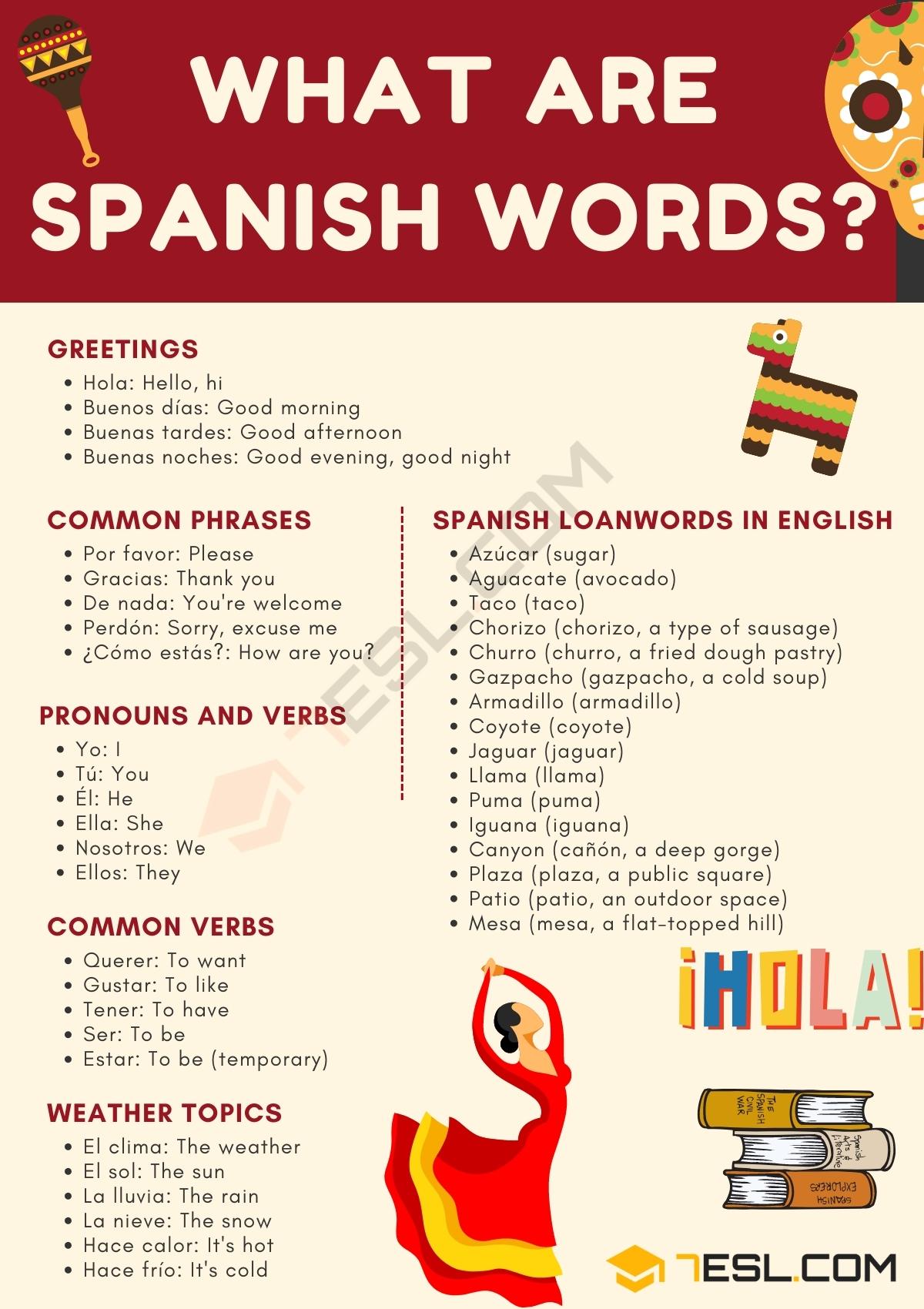Spanish Words
With many Spanish-speaking countries in close proximity to English-speaking nations, it’s no surprise that numerous Spanish words have found their way into everyday English use. This page will explore some of the most common Spanish words in English and reveal the fascinating connections between these two languages.
Contents
Common Spanish Words in English

Common Phrases | Spanish Words
There are numerous Spanish phrases that English speakers often use in their daily lives. These phrases help create a sense of familiarity between individuals. Some common Spanish phrases include:
- Hola: Hello, hi
- Por favor: Please
- Gracias: Thank you
- Mi Amor: My love
Food and Drink | Spanish Words
The English language has adopted numerous Spanish loanwords related to food and drink. Some examples include:
- Azúcar (sugar)
- Aguacate (avocado)
- Taco (taco)
- Chorizo (chorizo, a type of sausage)
- Churro (churro, a fried dough pastry)
- Gazpacho (gazpacho, a cold soup)
Animals | Spanish Words
There are also several Spanish-origin words for animals in the English language. For instance:
- Armadillo (armadillo)
- Coyote (coyote)
- Jaguar (jaguar)
- Llama (llama)
- Puma (puma)
- Iguana (iguana)
Arts and Leisure | Spanish Words
Spanish loanwords have also been introduced into the arts and leisure domain of the English language, as shown in the following examples:
- Salsa (salsa, dance style and music genre)
- Flamenco (flamenco, a form of Spanish song and dance)
- Aficionado (enthusiast, usually used for art and sports admirers)
- Desperado (desperate or reckless person, often referring to outlaws in old western movies)
Places and Geography | Spanish Words
The Spanish language has also contributed geographical terms to the English language, including:
- Canyon (cañón, a deep gorge)
- Plaza (plaza, a public square)
- Patio (patio, an outdoor space)
- Mesa (mesa, a flat-topped hill)
- Archipelago (archipiélago, a group or chain of islands)
Expansion of Spanish Vocabulary in English
Spanish Slang Words Used in English
Many English speakers have adopted Spanish slang words into their everyday vocabulary. Some of these words might already be familiar, such as “no” (meaning “no” in both languages) and “mesa” (meaning “table” in Spanish).
As English speakers become increasingly exposed to Spanish through media, travel, or interactions with native speakers, they adopt these slang words, incorporating them into their conversations. Teachers and learning websites often encourage this practice as it promotes better understanding between Spanish and English speakers.
Spanish Idioms and Phrases Used in English
In addition to slang words, Spanish idioms and phrases have made their way into the English language. These expressions can often be found in literature, movies, and conversations among bilingual speakers or learners. For example, phrases like “Estar en las nubes” (literally “to be in the clouds,” meaning “daydreaming”) and “Echar agua al mar” (literally “throwing water into the sea,” meaning “doing something pointless”) have become popular idiomatic expressions in English.
Spanish Words with Images
EEUU Meaning
More interesting articles
- “Ay Caramba” Meaning, Origin and Examples
- “Cabron” Meaning, Origin and Examples
- “De Nada” Meaning, Origin and Examples
- “Guapo” Meaning, Origin and Examples
- “Hasta La Vista Baby” Meaning, Origin and Examples
- “Papi Chulo” Meaning, Origin and Examples
- “Que Sera Sera” Meaning, Origin and Examples
- Besos Meaning: What Does Besos Mean? with Useful Examples
- Bodega Meaning: What Does Bodega Mean? (with Useful Examples)
- Bonita Meaning, Origin and Examples
- Buenas Tardes: Definition and Examples of this Interesting Phrase
- Chica Meaning: What Does Chica Mean and Stand for?
- Encanto Meaning: What Does The Term “Encanto” Mean?
- Ese Meaning: What Does the Slang Term “Ese” Mean and Stand for?
- Fuego Meaning, Origin and Examples
- Hermosa Meaning, Origin and Examples
- Hyna Meaning: What Does Hyna Mean?
- Linda Meaning, Origin and Examples
- Mamacita Meaning, Origin and Examples
- Mi Amor Meaning: What Does “Mi Amor” Mean?

